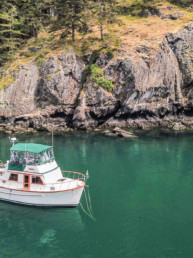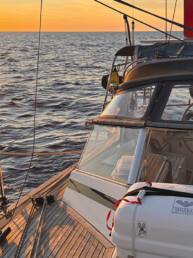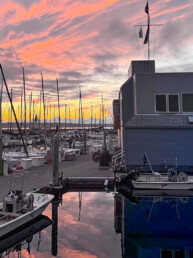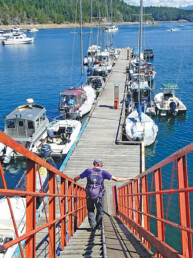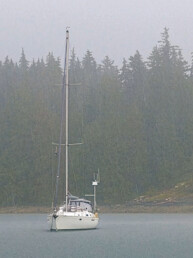This article was originally published in the August 2021 issue of 48° North.
In some ways I never really returned from the Inside Passage. After my meandering, six-week solo journey from Port McNeil to Anacortes in 2019, I found it difficult to sleep, waking odd hours in a sudden panic that I was dragging anchor or experiencing nightmares about lost oars and rogue waves. My body was on land, but my mind was still at sea — a condition I found oddly satisfying, proof of how thoroughly the long days on the water had affected me.
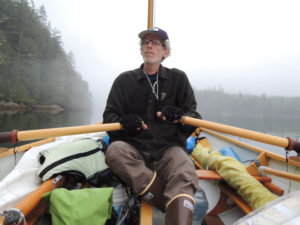 I often thought of the morning when I rowed out of a tranquil inlet as the tide was turning. Looking down as I crossed the bar, I was shocked to see claw-like rocks just inches beneath my hull. Outside, I faced choppy seas and a sudden, fierce wind. I couldn’t turn back. Momentarily paralyzed about what to do, I hove to. I quickly realized I only had one choice: reef the main and set sail before I was washed on a lee shore. Once underway, the boat surged and skated over waves and through troughs, as if pulled onward by a hidden magnet. A foaming wake trailed behind, making an impressive hissing sound. I was thrilled with the speed and adrenaline of making such swift, smooth progress. Mountain peaks seemed to appear and slide out of view. It was the best sailing day of the entire trip; and back home, it replayed in my mind whenever I dreamed of being back on the Inside Passage. The only thing that could have improved the experience, I always thought during these daydreams, would have been someone there to share it with.
I often thought of the morning when I rowed out of a tranquil inlet as the tide was turning. Looking down as I crossed the bar, I was shocked to see claw-like rocks just inches beneath my hull. Outside, I faced choppy seas and a sudden, fierce wind. I couldn’t turn back. Momentarily paralyzed about what to do, I hove to. I quickly realized I only had one choice: reef the main and set sail before I was washed on a lee shore. Once underway, the boat surged and skated over waves and through troughs, as if pulled onward by a hidden magnet. A foaming wake trailed behind, making an impressive hissing sound. I was thrilled with the speed and adrenaline of making such swift, smooth progress. Mountain peaks seemed to appear and slide out of view. It was the best sailing day of the entire trip; and back home, it replayed in my mind whenever I dreamed of being back on the Inside Passage. The only thing that could have improved the experience, I always thought during these daydreams, would have been someone there to share it with.
My life at home was comfortable, even easy, but after a few months, the lack of new stimulation made my days feel flat and uninspiring. I spent my non-moping hours thinking about how and when to go back. But by late in the winter of 2020, my funk had transformed to creativity: I wrote and performed a one man storytelling show about my journey, excited about reliving the highlights and getting others stoked on adventuring.
As I practiced the stories and got my wife’s feedback, their strength grew. The mystique of breaching whales, dinners with friendly cruisers, and secluded coves fired my wife’s imagination, transforming her from an occasional crew member to a potential partner in future northern cruising adventures. “Find a bigger craft than that old sail and oar boat,” she said, “one with a snug cabin, and I’m in.”
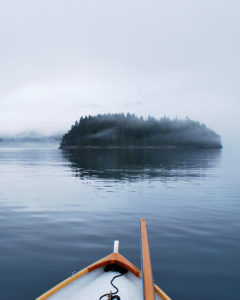 So the search began for the right trailerable boat for our dreams: a little salty, but not too needy; big enough for two, but small enough to singlehand. Miraculously, by the first week of March 2020 I had been introduced to a collector who was big on acquiring boats, but not fond of actually using them. He had a handful of small craft out in the farm country and one, a 19-foot yawl-rigged catboat called a Chebacco, seemed like a match. He’d hauled it home from the Port Townsend Wooden Boat Festival 10 years previously and never sailed it. A quick internet search about the boat turned up a grainy photo showing a striking lapstrake hull and purple heart trim. A sailor described her as “the queen of the fleet.”
So the search began for the right trailerable boat for our dreams: a little salty, but not too needy; big enough for two, but small enough to singlehand. Miraculously, by the first week of March 2020 I had been introduced to a collector who was big on acquiring boats, but not fond of actually using them. He had a handful of small craft out in the farm country and one, a 19-foot yawl-rigged catboat called a Chebacco, seemed like a match. He’d hauled it home from the Port Townsend Wooden Boat Festival 10 years previously and never sailed it. A quick internet search about the boat turned up a grainy photo showing a striking lapstrake hull and purple heart trim. A sailor described her as “the queen of the fleet.”
We were sold.
I couldn’t believe my luck — until we arrived at the collector’s rural spread, where the potential boat of my dreams was covered by a moldering tarp. Peeling it back, I peered inside, only to see a bog of damp leaves and water lurking in the Chebacco’s cockpit. After bailing it out, I realized there were no drain holes. A stench from the lockers made me flinch, but I was still feeling optimistic, so I opened a hatch, revealing dozens of soaked mouse nests. As I probed a soft spot in the hull, I was torn between my dream of sailing the Inside Passage with my wife and reality of the work involved in restoring this boat. I had to leave and get some perspective.
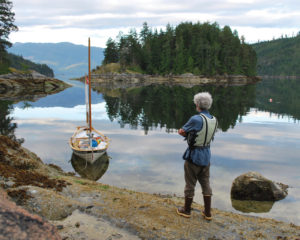 During the following week I managed to push the thought of all that work out of my mind, focusing instead on visions of sunny days spent flying across the water with my mate at my side. Despite rumors of an impending pandemic, I withdrew a few thousand dollars from my bank account and trekked back to the collector’s farm.
During the following week I managed to push the thought of all that work out of my mind, focusing instead on visions of sunny days spent flying across the water with my mate at my side. Despite rumors of an impending pandemic, I withdrew a few thousand dollars from my bank account and trekked back to the collector’s farm.
But nothing went as planned when I hooked the Chebacco’s trailer to my car. The bumper sagged comically, like a cartoon mishap, sending the front of the car into an upward tilt. I sat down on the grass for a long time, pondering how I could better balance the boat and adjust the trailer. A thunderstorm of doubt crashed through my mind: Will hauling this boat hurt the transmission? What if the hull is really rotten? Will the virus get me? Will I need this money if I lose my job?
Unable to decide what to do, I walked away from the purchase and hunkered down, imagining myself waiting out a storm at anchor. Eventually, I convinced myself that I’d made
the right decision.
I spent the next year sailing closer to home, enjoying what I have, and feeling lucky that my family and I had survived the pandemic in good health and fortunes. But dreams die hard, and as summer 2021 has rolled in, my imagination still carries me to the Inside Passage. Now, my dreams are focused on the future, and on the stories to come, the ones my wife and I will write together in those beautiful northern waters … when we find the right boat.
Bruce Bateau sails and rows traditional boats with a modern twist in Portland, Ore. His stories and adventures can be found at www.terrapintales.wordpress.com.
Bruce Bateau
Bruce Bateau sails and rows traditional boats with a modern twist in Portland, Ore. His stories and adventures can be found at www.terrapintales.wordpress.com

